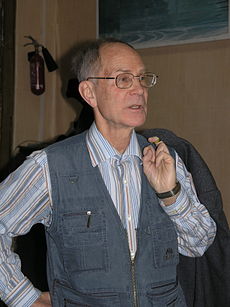
Vladislav Krasnov
Vladislav Krasnov, Ph.D., is a Russian-American scholar, publicist, and peace activist. Since 1992 he runs the Russia & America Goodwill Association.
 It was the first opportunity in a decade for President Putin to give a global vision of the situation based on the state interests of Russia. He used this opportunity very skillfully: his delivery was diplomatic, conciliatory, balanced and authoritative. One felt at once that he spoke for the entire country.
It was the first opportunity in a decade for President Putin to give a global vision of the situation based on the state interests of Russia. He used this opportunity very skillfully: his delivery was diplomatic, conciliatory, balanced and authoritative. One felt at once that he spoke for the entire country.
He was right to draw attention to the most pressing issue: the struggle for global hegemony the United States and its Western allies in the Middle East have opened Pandora’s Box. Destroying the largest secular states in the Middle East, Iraq, Libya, Egypt, Afghanistan, Syria, they did not create democracy as promised, but new hotbeds of terror and quasi-religious fanaticism.
In this chaos there emerged the so-called "Islamic State”, which now undermines stability not only in the Middle East and Africa, but also, through waves of refugees, in Europe as well. Now the US and its Western allies recognized their inability to cope with the chaos that they themselves bred and unleashed. "By creating a foothold in Syria and Iraq, the "Islamic State” "is actively expanding to other regions, aimed at domination in the Islamic world and not only there,” Putin said, noting that "The situation is more than dangerous.”
He stressed that the ISIL is the so-called Islamic state, because of its ideology and practice have nothing to do with Islam, and, at best, are run by renegades from Islam.
Hence Putin’s proposal: to create a UN-led broad coalition, which could include the United States, its Western allies, as well as China and Russia. But "the key actors in such a coalition should be Muslim countries”, for the ISIL "not only directly threatens them, but also, by its bloody crimes, defiles the world’s great religions – Islam”.
As if responding to the constant accusations that he allegedly revives the Soviet empire, Putin strongly condemned Soviet-era foreign policy: "For example, we remember and examples from the history of the Soviet Union. Export of social experiments, attempts to spur changes in different countries, based on their ideological, often led to tragic consequences, it does not lead to progress, but to degradation”.
Putin not only condemned Soviet-era policy, but also hinted that it was the US and its allies who are now repeating the mistakes of Soviet leaders, for they "seem not to learn from (Soviet) mistakes, but only repeat them. Though now they export of the so-called "democratic” revolution”.
Putin acknowledged that Russia’s interest to the ISIL is not accidental, for Russia not only accepts refugees from the Middle East, but is subjected to terrorist attacks by forces, ideologically associated with the ISIL.
As to the events in Ukraine, Putin put them in the light of the US desire for world hegemony. Be preserving and expanding NATO, the United States "forced the post-Soviet countries face a false choice: be it the West or East? Sooner or later, such a confrontational logic was to turn into a serious geopolitical crisis. It happened in Ukraine, where dissatisfaction of many people with the existing government was used by outside forces to instigate an armed coup. As a result, civil war broke out. "
"We are convinced that the only way out of this dead end lies through comprehensive and diligent implementation of the Minsk agreements of February 12th, 2015. Ukraine’s territorial integrity cannot be secured through the use of threats or military force, but it must be secured. The people of Donbas should have their rights and interests genuinely considered, and their choice respected; they should be engaged in devising the key elements of the country’s political system, in line with the provisions of the Minsk agreements. Such steps would guarantee that Ukraine will develop as a civilized state, and a vital link in creating a common space of security and economic cooperation, both in Europe and in Eurasia.”
In its conciliatory tone of Putin’s speech it was close to the speech of UN Secretary General. At the opening of the General Assembly, Ban Ki-moon urged the Security Council permanent members to put aside their ideological differences, in particular, to stop the bombing of Yemen and for the establishment of peace in Syria among the key states called Russia, the United States, Saudi Arabia, Iran and Turkey.
Call of Secretary General and President Putin to compromise and a broad coalition of sovereign states with different forms of government in order to maintain peace and civility in the world corresponds to the objectives of RAGA (Russia-America Goodwill Association which the author presides – OR). The US and Russia need to put aside what divides us, and look for something in common that brings us together. In this case, it is the task of eliminating ISIL and other radical groups as the main troublemaker in the Middle East.




_jpg/250px-ElbeDay1945_(NARA_ww2-121).jpg)





